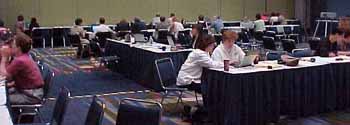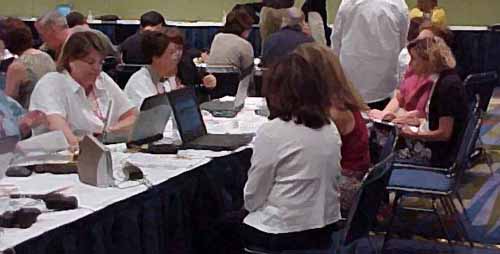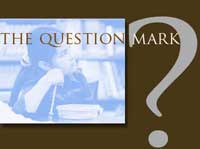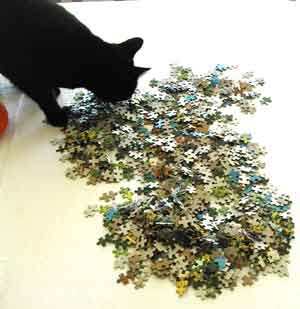| Synthesis and Bettering as Constructing
This article begins with a painting of a home partially constructed. It stands as a metaphor for the synthesis and bettering thought process, as a thinker must recombine and modify the elements of the object or process being improved much as an architect and a builder might instruct a carpenter to arrange 2x4s and other pieces of lumber to construct a house.
The real synthesis in home design begins in the planning stages, as an architect plays with thousands (perhaps millions) of possibilities in order to create a house that will satisfy a number of criteria such as cost, comfort, style and environmental responsibility.
By the time the carpenters are hammering nails, there is little room left for synthesis or bettering, as they are usually following a prescriptive plan that leaves little room for modification.
In June and September of 2001 I published two articles that make good companion pieces for this one:
- That article lists and describes synthesis strategies worth learning.
- SCAMPER
- The Questioning Toolkit
- The Scientific Method
- von Oech's A Whack on the Side of the Head
- deBono’s Thinking Hats
- Michalko's ThinkerToys
- Mental Mapping and Cluster Diagramming
| That article employs carpentry in the design of a grape arbor as the central metaphor for the bettering of ideas. |
 |
Cooking with Bloom - Bettering the Omelet
In order to acquaint teachers with the skills associated with synthesis, I have used the following professional development activity with great success. Originally part of a morning I called "Cooking with Bloom," this activity relies upon a right side of the brain, multi sensory experience to give the audience a memorable experience with synthesis that will stick with them for life. Instead of relying upon dry abstractions, the activity takes advantage of smell, sight, sound and taste.
- Step One - Assemble all tools and ingredients for the demonstration.
- Hot plate
- Frying pan
- 3-4 eggs
- Butter
- Red pepper flakes
- Spatula
- Very smelly cheese
- Cooking mirror as used by home economics teachers
- Step Two - Explain to your group that the focus of the lesson is upon synthesis, also known as "bettering." You will be cooking an omelet rather badly, and their job is to keep track of the steps on a piece of paper and then suggest ways to improve the cooking process - thereby bettering the omelette.
-
- Step Three - Make sure the frying pan is very hot - then add the smelly cheese and let it melt some until the smell begins to spread through the room and you hear groans. Make effective use of the cooking mirror so the audience can see as well as smell what is happening in your pan.
-
- Step Four - Crack each egg and drop it shells and all into the pan with the bubbling cheese mixture.
-
- Step Five - Take a big chunk of butter and add it next to the eggs and egg shell mixture, commenting that butter is important to keep the omelette from sticking.
-
- Step Six - Empty the entire bottle of red pepper flakes into the pan and stir.
-
- Step Seven - Remind the group that they should be making a list of suggested improvements or changes as the omelette cooks.
-
- Step Eight - Collect suggested strategies up on the screen using a mind-mapping tool such as Inspiration™ and then see if they can be grouped according to the SCAMPER model described at the beginning of this article.
Problem-Based Learning and Authentic Learning - Synthesis on a Large Scale
When we involve students in suggesting ways to better their community or tackle a nagging social or environmental problem, we are asking them to perform synthesis at the highest level. It is not sufficient for them to study the problem or describe the problem. It is not enough to cut and paste the thinking of the sages. In many of these cases, the sages and the elders have failed, so it is incumbent upon the students to "do a better job" and add value to the action plans of the past.
Hands-on Professional Development for Synthesis
When teachers have a chance to learn synthesis with hands-on activities, their grasp of the approach is stronger than when the concept is just abstract and theoretical. A few years back I created a set of hands-on modules for the NECC conference that addressed this need and the following goals:
 |
Power Learning 2.0
Beyond Interpretation to Synthesis
Welcome to this hands-on workshop which is designed to give you experience creating new ideas while employing various information literacies - understanding in service to invention.
|
Expected Outcomes
- Experience firsthand the challenge of moving beyond interpretation and understanding to synthesis - the actual construction of new ideas.
- Learn how to focus classroom investigations around decisions and problems drawn from the community and the global neighborhood. Engage students in making their own meaning (constructivism) from the vast new information landscape that is made readily and rapidly available thanks to new technologies.
- Consider how the role of classroom teacher changes in such a program.
- Witness how we may provide structure and scaffolding to maintain quality and focus.
- Explore how students can learn to build their own new meanings and solutions upon conventional wisdom, contributing fresh thinking to important social issues or scientific challenges.
- Begin to develop a personal repertoire of synthesis skills.
- Identify opportunities to teach to curriculum standards by emphasizing decision making and problem solving.
- Taste the power of Inspiration™ to support this kind of thinking, investigating and inventing.
- Consider the benefits of teams sharing wireless laptops.
 )
|
| You will find a description of these activities at http://fnopress.com/PL2/index.htm
Conditions of use: These materials may be used without charge by individual visitors to this Web site, but schools, districts, consultants, companies and any other organizations may not use these pages for group sessions without explicit permission and without purchase of rights. Click here for information on site licenses and costs. In no case may they be downloaded or whacked to be served or distributed or used on any network without explicit written permission from the author and copyright holder.
|
|


